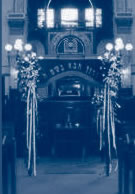|
SEDRA : Vaera: Hertz Chumash p. 232 Exodus
Chapter 6 Verse 2
This week's Sedra is generously sponsored by Avi Berman
SYNOPSIS:
G-d reassures Moses following the great despair accompanying
the first and absolute rejection by Pharaoh of Moses' demands
on behalf of the Israelites. G-d restates His covenant and
relationship with the Patriarchs and in a powerful declaration
He reveals the 4 stages of Redemption which will come about
through His intervention for He is fully aware of the suffering
of His people.
The people are so deeply oppressed that they do not accept
this reassurance which results in Moses too suffering a crisis
of confidence. G-d however insists and orders Moses and Aaron
to initiate the redemption. The Sedra now presents a genealogy
of Moses and Aaron, the descendants of Levi as they now formally
assume the role of representing the Israelites.
G-d emphasises Moses' role as G-d's representative to Pharaoh
with Aaron as "prophet" or spokesman. These meetings
take the form of an extended series of dramatic confrontations.
The pattern which emerges is that Pharaoh will continually
harden his heart, but his power and self-confidence will be
repeatedly and dramatically crushed by G-d's great wonders
and signs until all Egypt will clearly know His greatness.
Having been instructed by G-d, Moses and Aaron demonstrate
the first sign: Aaron casts his rod down and it changes into
a snake. Pharaoh's wizards do likewise, but their serpents
are eaten by that of Aaron. Pharaoh's heart hardens and he
refuses to comply.
This is followed by the first plague foreshadowed by Moses
and effected by Aaron who, in the presence of Pharaoh and
his advisers, puts out his rod and turns all the waters of
Egypt into blood. Pharaoh's wizards are able to copy this
and he again refuses to be budged.
After seven days Moses confronts Pharaoh and requests permission
for the Israelites to depart to serve their G-d. He warns
Pharaoh that refusal will result in a plague of frogs. Pharaoh
is unmoved.
The plague is brought into effect and Pharaoh's wizards are
able to copy the miracle. Pharaoh budges temporarily and the
next day the plague ceases. Once the plague is lifted he again
resumes his intransigence.
Aaron is then commanded to retaliate by bringing on a plague
of gnats. The magicians are stumped by this and begin to recognise
the Divine Power, but Pharaoh holds firm in his refusal.
The fourth plague - a mixture of pests - is invoked and in
this plague the land of Goshen where the Israelites live is,
by design, completely unaffected. The plague is immensely
destructive and Pharaoh calls upon Moses to bring relief and
he offers the Israelites the opportunity to serve G-d in Egypt.
Moses insists that the people must serve G-d in the wilderness
where He directs. Pharaoh consents but with the removal of
the plague he immediately reneges on his promise.
G-d then commands Moses to threaten Egypt's herds of livestock
with pestilence. Again the Israelites' stock will remain completely
unscathed. The plague is brought on and again Pharaoh is resolute
in his stubbornness.
Moses is now instructed to cause the sixth plague: boils.
This plague affects every Egyptian individually. The magicians
in particular are overwhelmed by their powerlessness to do
anything to ward off the plague - for they too are greatly
affected. Pharaoh remains unmoved in his refusal. Moses is
instructed to warn Pharaoh yet again.
He threatens a plague of hail and warns Pharaoh that every
living thing should be brought under shelter for the plague
will be ferocious and all-consuming. The plague is invoked
with massive destructive consequences for the countryside
of Egypt. The Israelites and their property are untouched.
Pharaoh hastens Moses into his presence and confessing his
guilt begs him to have G-d stop the hail. Moses complies,
the tempest abates and reveals the complete devastation of
the land of Egypt. Again Pharaoh's heart hardens and he refuses
to let Israel depart.
HAPHTORAH : HERTZ CHUMASH P. 244 Ezekiel Chapter 28. Verse
25
The common theme between the Sedra and Haphtorah is the prediction
of another destruction of Egypt. Egypt's great reliance on
the Nile which is the source of its great wealth and power
is gravely threatened. Egypt will be overrun by the Babylonians
and its demise will pave the way for Israel's restoration.
TELL ME RABBI ... Minyan
The quorum of ten needed for the conduct of public religious
worship is called a MINYAN, literally, "a number".
The basis for ten as the quorum is the Biblical passage in
Numbers 14:27, where the term EDAH which means a congregation
is used. The reference here is to the ten spies (out of the
twelve) who brought back to Moses the pessimistic report of
their expedition into the land of Canaan.
That less than ten is not regarded as a community is also
alluded to in the Torah. Abraham stopped his bargaining with
G-d to save Sodom and Gomorrah after he reached the figure
of ten (Genesis 18:16-33). As long as ten righteous men could
be found, the merits of the righteous community, though small,
could be weighed against the sins of the wicked community.
With less than ten, they could be regarded only as individuals.
The basis for requiring a minyan for prayers that sanctify
G-d's name is Leviticus 22:32: "...that I may be sanctified
in the midst of the Israelite people." The sanctification
of G-d's Name is not a private matter, but a public act in
the midst of a community.
The portions of the service requiring a minyan are:
Kaddish, Sanctifying of G-d
Kedusha, Sanctifying of G-d
Barchu, The call to bless G-d
Birkat Kohanim, the Priestly Benediction
Reader's repetition of the Amidah Reading of the Torah
Where there is no minyan we may recite all prayers, excluding
those enumerated, privately as individuals or in unison under
the leadership of a Reader.
BACK TO SHABBAT SHALOM
TABLE
|








